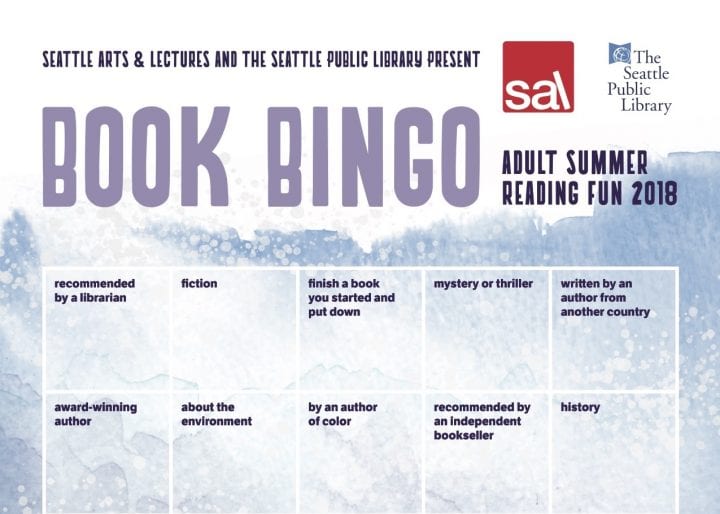
Beyond Temple Grandin: 20% for Summer Book Bingo
June 13, 2018
Summer Book Bingo is designed to provide free summer reading fun for both adults and kids. Last summer, participants read a whopping total of 10,870 books and submitted 668 entries and 323 blackouts—let’s do it again! Download an Adult Bingo Card or a Kids Bingo Card and spend the summer of ’18 reading great books.
In this guest post, education advocate Carrie Griffin Basas gives us a challenge: to fill 20% of our boards with books by authors with disabilities to reflect 20% of the population. Read on for recommendations that could work for your author (or) character has a disability square and many, many more.
By Carrie Griffin Basas
As a child, I remember the reading contests that my local library in Maryland hosted. I was already the kid who worked through shelves of the children’s section. Summer brought extra delight and pressure weekly as I loaded trash bags of books to take home. I probably finished those bingo squares in a week or so, but I kept going.
One thing that I did not see in those books was my own lived experience as a girl with disabilities, certainly not told by authors with disabilities that I knew of, that wrote about disability as I felt it—complex, compelling, and often marginalizing. Disability was, and is, so much a part of me that I looked for stories to grapple with it. Representation matters. Even though I found the disability rights movement half a lifetime ago, I still scan books, films, and art for more of the voices of my community. Our stories need to be told and told by us. Until everyone has access to that experience, we will continue to see disability as something less than whole, a source of shame, something to be overlooked.
That experience troubles me. In my day job, I run a small state government agency that supports families and schools to work through their conflicts in public K-12 education collaboratively. Half of the concerns that we receive involve students with disabilities. I wonder how those students envision their futures when much of our media is devoid of their stories and when non-disabled people often control those representations. And I also think of my wish as a child to see adults with disabilities as leaders and storytellers around me, in the ordinary settings, from my classroom to my bus, from summer camp to my doctor’s office.
Much of the trope about disability is its rarity—how it involves “special needs” or something very much outside our norm. In my work and through facilitated discussion and trainings, I invite others to create counter-narratives and challenge how we frame what is normal. What if we acknowledged that almost 20% of our population in this country has disabilities? How would that change who speaks, writes, and represents?
When asked to contribute suggestions to SAL and SPL’s Summer Book Bingo, I began to think of all the books that I could cram into that “author (or) character has a disability” square. And then I decided that I wouldn’t. For my version of the summer book bingo challenge, I invite you to have 20% of your reading reflect 20% of the population and not just because we have the honor of hosting the USA Special Olympics Games. Let’s do it together because we don’t hear these voices enough and it might fulfill your square for “LGBTQIA author or character,” “by an author of color,” “local author,” “memoir or biography,” or “about the environment.” I was tempted to fill your entire card, but here are five (20% of your card) places to begin—to interrogate what we consume and by whom.
And you won’t see Temple Grandin on this list. We need to know more about disability than Temple, Helen Keller, Stevie Wonder, and Marlee Matlin. For every interest that you have, every kind of book that you want to read, you can identify an author with a disability. Let that search begin.
LGBTQIA author or character:

Corbett Joan O’Toole, Fading Scars: My Queer Disability History (2016).
I have known about Corbett’s activism for over twenty years. From her involvement with the Beijing Women’s Conference to her protests over 504 and ADA justice, she brings together cross-movement activism with humor, strength, and vulnerability in this memoir. She interrogates what marginalization means and what community can look like. (Alternatively: fulfills history in its documentation of the disability rights movement.)
By an author of color:
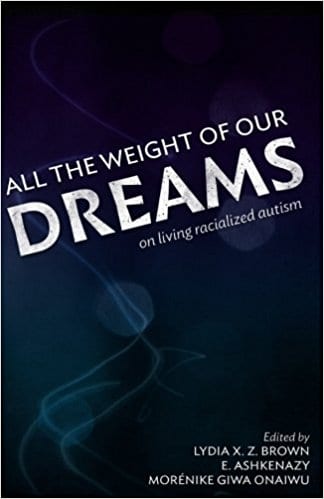
Lydia X. Z. Brown, E. Ashkenazy, and Morénike Giwa Onaiwu (eds). All the Weight of Our Dreams: On Living Racialized Autism (2017).
As a former disability rights lawyer, I can be tempted to speak in universalizing tones about what disability means or what “our” needs look like. I have written elsewhere about how the disability rights movement can be too white in its advocacy and leadership. It can also be framed from too neurotypical of a standpoint. This anthology by autistic people of color (their framing) features 61 writers from 7 countries reflecting on what autism and racism look like through essays, poetry, fiction, and visual arts. It is both an exploration of the “outside the bubble” square for many of us, as well as a call to action to understand the meaning of identity and effective allyship. (Alternatively: fulfills the LGBTQIA or essays squares).
By a local author:
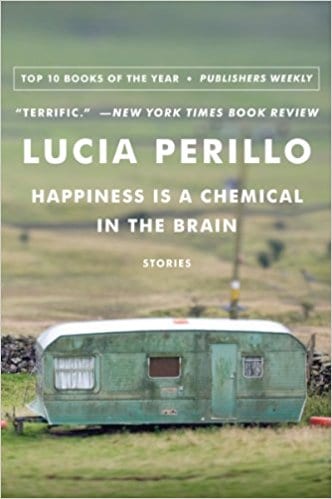
Lucia Perillo. Happiness is a Chemical in the Brain: Stories (2013).
I recognize that beginning to consume different images of disability might mean looking for a book that is less political and more about how disability shapes literary voice. Lucia Perillo was diagnosed with multiple sclerosis in her thirties. While she has a memoir on her experiences, she resonates the most with me in the stories she tells that are not explicitly about disability; yet those stories capture disability experiences—such as ambivalence, community, fear, and joy. Lucia lived in Olympia until she passed away in 2016. (Alternatively: fulfills fiction square. Check out her poetry as well.)
Memoir or biography:
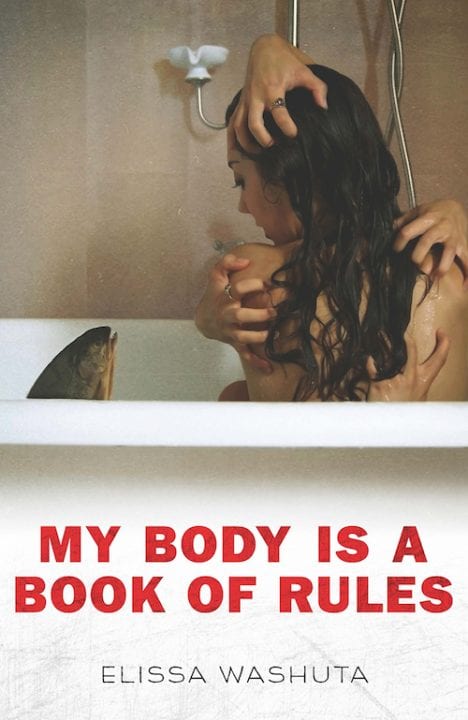
Elissa Washuta. My Body is a Book of Rules (2014).
I took Elissa’s memoir class at Hugo House right before this collage-style memoir was published. I return to this book (which was a Finalist for the Washington State Book Award) often because the structure fascinates me. She uses letters, timelines, scientific studies, popular culture, and scraps of memories, to create a painful and evocative narrative that grapples with sexual violence, bipolar disorder, body image, and Native identity. Until just a year ago, she would have fulfilled the local author category. (Alternatively: fulfills “made you cry or laugh out loud,” “by an author of color,” or “recommended by an independent bookseller.”)
About the environment:
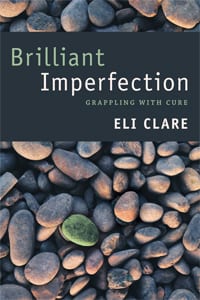
Eli Clare. Brilliant Imperfection: Grappling with Cure (2017).
When I started reading this book, I was confused. I picked it up assuming that it would confront how the medicalization of disability in our society has pushed surgeries and interventions to normalize disabled bodies and minds. When Eli began to weave these pressures of conformity with gender identity, transphobia, government-to-government relations with tribes, and environmental destruction, I settled into the wonder of my confusion. By the end, I was disappointed in myself for not having seen the connections before and glad that I stayed in the complexity. This book is a mediation on how we are connected to and situated within our environments—and the opportunity and resistance that relationship can bring. (Alternatively: fulfills LGBTQIA author or award-winning author squares.)
I could recommend books for all of the squares, but sharing some of my favorites has made me consider what I could be reading to engage with the world on new terms. I am off to complete my card and reread El Deafo. If you want to take the 20% summer bingo challenge, tag your posts and pictures with #disabilitybookbingo and #BookBingoNW2018.
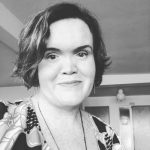 Carrie Griffin Basas works in education advocacy. She is a former law professor focusing on disability rights, civil rights, and health justice. She is the co-editor of Lawyers Lead On: Lawyers with Disabilities Share Their Insights (2011). Carrie has a MEd in Education Policy, Organizations and Leadership from the University of Washington. She earned a Juris Doctorate from Harvard Law School and an Honors B.A. from Swarthmore College. She enjoys playing summer reading bingo and Rainbow Bingo in Seattle when she can. She is always up for a good writing class at Hugo House or some time with her husband, daughter, bunnies, and dog. She recently gave an Ignite talk as part of the Seattle Times’ Education Lab event. Find her on Twitter or on Instagram and tag your posts with #disabilitybookbingo and #BookBingoNW2018.
Carrie Griffin Basas works in education advocacy. She is a former law professor focusing on disability rights, civil rights, and health justice. She is the co-editor of Lawyers Lead On: Lawyers with Disabilities Share Their Insights (2011). Carrie has a MEd in Education Policy, Organizations and Leadership from the University of Washington. She earned a Juris Doctorate from Harvard Law School and an Honors B.A. from Swarthmore College. She enjoys playing summer reading bingo and Rainbow Bingo in Seattle when she can. She is always up for a good writing class at Hugo House or some time with her husband, daughter, bunnies, and dog. She recently gave an Ignite talk as part of the Seattle Times’ Education Lab event. Find her on Twitter or on Instagram and tag your posts with #disabilitybookbingo and #BookBingoNW2018.